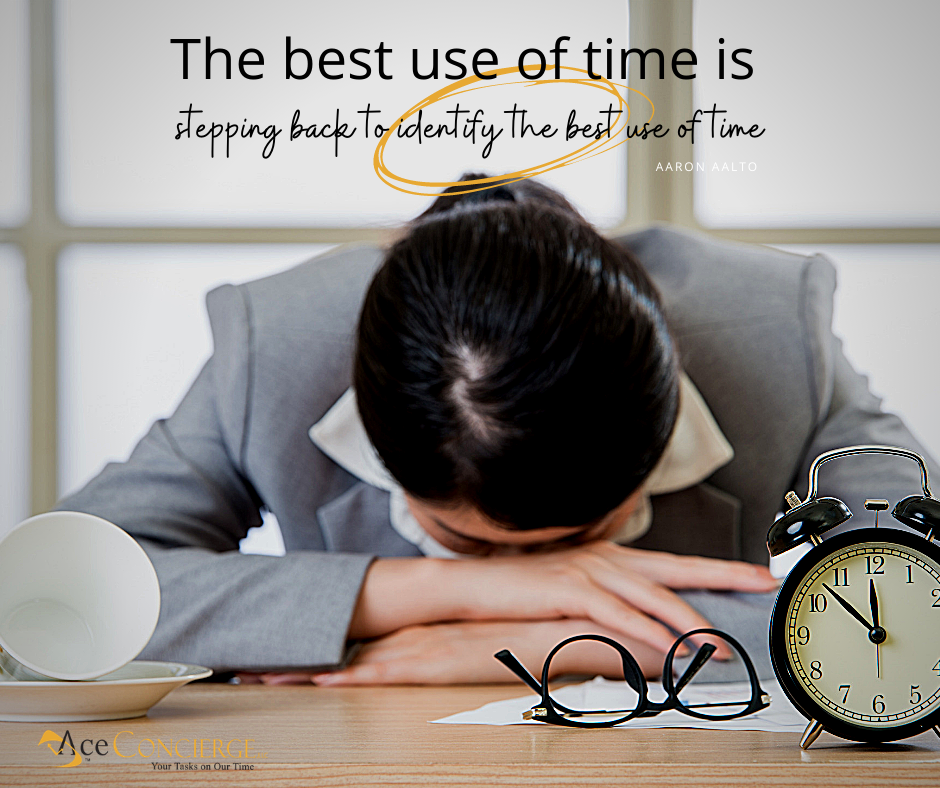
by Ace Concierge | Virtual Assistant | Mar 27, 2024 | Business Transformation, Delegation

Greetings fellow entrepreneurs,
I’m here to share my transformative journey – a shift from being a one-person powerhouse to embracing strategic delegation. It’s a story of efficiency, sanity, and achieving sustainable success in business.
The DIY Dilemma: A Prelude to Change
Many years ago, I found myself burning the midnight oil, surrounded by stacks of tasks, and constantly feeling the weight of running every aspect of my business single-handedly. I took pride in being a one-person army, juggling tasks from marketing to admin. The belief that doing it all would equate to more success was my guiding principle. Little did I know, I was unknowingly boarding the express train to Burnout City.
Pain Point 1: The Myth of Multitasking
In the quiet hours of the night, accompanied by never-ending to-do lists, I attempted to wear every hat in my business. The seductive appeal of multitasking, the notion that managing everything equated to success, ensnared me in its intricate web. It didn’t take long for me to recognize that, amidst the juggling act, I was merely managing rather than genuinely excelling.
Pain Point 2: The Illusion of Control
While I once prided myself on absolute control, the growing workload prompted a shift in perspective. Embracing a growth mentality, I chose to let go to grow. This strategic decision is a decisive move toward scalability and long-term success.
Pain Point 3: The Toll on Well-being
Success at the expense of my well-being wasn’t success at all. The pressure of managing it all was taking a toll on both my physical and mental health. It was time to reassess my approach, reevaluate my priorities, and consider a more sustainable path.
The Turning Point: Recognizing the Need for Strategic Change
Amid this chaos, a realization hit me like a breath of fresh air. I came across a Richard Branson quote: “If you really want to grow as an entrepreneur, you’ve got to learn to delegate.” It was a lightbulb moment – a revelation that pointed towards a more strategic and sustainable way of managing my business.
Solution 1: Delegating for Sustainable Success
Enter strategic delegation – my newfound ally. I decided to bring an executive virtual assistant on board, not as a lifeline, but as a partner in my journey. Delegating tasks allowed me to reclaim valuable time and redirect my focus toward areas where my skills truly shined.
Solution 2: Precision Through Specialization
Delegating tasks didn’t mean relinquishing control; it meant gaining precision. I enhanced my business’s overall efficiency by bringing in individuals with expertise in specific areas. This strategic move elevated the quality of my business solutions and operations.
Solution 3: Balancing Act – Reducing Stress and Enhancing Well-being
The critical outcome of strategic delegation is a significant reduction in stress levels. Suddenly, the pressure lifted, and I had the time and mental space to focus on what truly mattered. My work-life balance was restored, and my business survived and thrived.
The Numbers Don’t Lie: Delegation’s Impact on Efficiency
Let’s look at some statistics. According to a Forbes article, CEOs who demonstrate exceptional delegation skills can achieve a remarkable 33% increase in revenue. In entrepreneurship, where time is the ultimate currency, strategic delegation emerges as the key to enhanced productivity.
Walking the Talk: Leading by Example
I’m not just singing the praises of delegation; I’m living it. My virtual assistant is not merely a support team member; she’s an integral part of my business’s success. I delegate to her, not as a means to cope but to ensure sustainable growth, provide exceptional customer experiences, reduce stress, and foster a healthier work-life balance.
The Final Verdict: A Strategic Shift for Sustainable Success
In a world that often glorifies the hustle, it’s crucial to recognize that sustainable success is the accurate marker of achievement. It’s not about doing it all; it’s about doing what matters most and well. Delegating isn’t a sign of disorganization; it’s a strategic move toward lasting success.
So, if you find yourself overwhelmed and yearning for a more sustainable approach, consider the power of strategic delegation. It works!!
Here’s to efficiency, balance, and the journey from DIY to a sustainable and successful business!
Cheers!!

by Ace Concierge | Virtual Assistant | Jan 3, 2024 | Delegation, Executive Assistant, Virtual Assistant

For executives, efficient time management is critical in achieving professional success, given the broad spectrum of responsibilities and limited time. From overseeing projects to attending meetings and responding to emails, executives face an extensive list of tasks that can be overwhelming. This post delves into the most pressing time management challenges faced by executives and presents a promising solution – the engagement of an executive virtual assistant (EVA).
The Overwhelming To-Do List: Prioritize and Conquer
Executives find themselves at the epicenter of ceaseless responsibilities, from steering high-priority initiatives to navigating everyday administrative tasks. The challenge lies not only in the volume of tasks but also in the critical decisions about time allocation, each carrying profound implications for the organization. Balancing this dense to-do list becomes a constant juggling act, demanding intentional thinking and a keen awareness of priorities.
Meetings Galore: Navigating the Time-Consuming Terrain
Meetings, a cornerstone of effective communication and collaboration, also emerge as a formidable time-consuming aspect of an executive’s routine. The necessity of attending internal team meetings, client presentations, and board meetings creates a complex landscape to navigate. While these interactions are essential, they can easily become a double-edged sword, consuming a significant chunk of an executive’s schedule. The challenge is not merely attending these meetings but doing so in a way that allows for sufficient time and focus on the tasks that truly matter – those that contribute to the organization’s strategic goals and long-term success.
Email Overload: Taming the Inbox Avalanche
Executives also face an unrelenting deluge of emails, each demanding attention and action. Managing this constant influx of information becomes a substantial time-draining challenge. Their inbox transforms into a battlefield where the war against email overload is fought daily. The struggle is not only to respond promptly but also to sift through the sea of messages, ensuring that crucial correspondence doesn’t get lost in the shuffle. Effectively managing emails is not just a matter of productivity but a fundamental aspect of maintaining a well-organized and responsive leadership style.
The Project Juggle: Orchestrating Success Amid Complexity
Executives shoulder the responsibility of overseeing ongoing projects while simultaneously initiating and planning new ones. This complex dance of project management demands careful planning and execution. Balancing multiple projects requires more than time management; it necessitates a tactical approach to resource allocation, risk mitigation, and team coordination. The consequences of failure in project management are severe – missed deadlines, cost overruns, and a potential negative impact on the organization’s overall success. Effectively managing these projects requires a delicate balance between leadership vision and hands-on execution.
In conclusion, executives face innumerable challenges in managing their time effectively. Whether it’s the overwhelming to-do list, the time-consuming nature of meetings, the constant battle against email overload, or the elements of project management, the demands are relentless. Navigating these challenges requires a combination of strategic thinking, delegation, and, increasingly, the adoption of new solutions to enhance efficiency. As executives strive to excel in their roles, finding the right balance becomes not just a personal challenge but a critical factor in shaping the success of the organizations they lead.
The Solution: The Executive Virtual Assistant
A game-changing, transformative option that more and more executives are using to deal with the excessive demands of their jobs is partnering with an executive virtual assistant (EVA). An inventive approach to time management is necessary as they confront the daunting obstacles presented by an endless to-do list, many meetings, email overload, and intricate project management.
The EVA is a skilled ally, ready to alleviate the burdens of routine administrative tasks. Delegating to a virtual assistant empowers executives to reclaim their valuable time. This shift not only optimizes the use of their unique skill set but also enhances overall productivity, allowing executives to focus on critical aspects that contribute significantly to the success of their roles and the organization.
Benefits:
Task Prioritization:
An executive virtual assistant excels in the art of task prioritization. By understanding the intricacies of an executive’s responsibilities, they efficiently organize and categorize tasks, ensuring that the most critical ones are given the attention they deserve. This ensures that executives can focus their energy on what matters most for the success of the organization.
Efficient Schedule Management:
The virtual assistant becomes a master conductor in the symphony of schedules. From coordinating meetings to managing appointments, the EVA navigates the densities of an executive’s calendar, optimizing time utilization. This not only prevents scheduling conflicts but also allows for the seamless integration of purposeful activities into the daily agenda.
Streamlining Administrative Duties:
Routine administrative duties, often a source of time drainage, are handled efficiently and precisely by the virtual assistant. From filtering and responding to emails to managing routine paperwork, an EVA ensures that the day-to-day operations of an executive’s office run smoothly. This streamlined approach allows executives to maintain focus on critical decision-making and leadership responsibilities.
Leveraging Efficiency for Success
Proficient time management is a vital element in the success of executives who face multifaceted responsibilities. In this context, the incorporation of the executive virtual assistant represents a significant breakthrough in addressing this challenge. By partnering with an EVA, executives can enhance their productivity and proactively lead their organizations to success in an increasingly competitive business landscape. The executive virtual assistant is not merely a tool, but a catalyst for transforming time management challenges into opportunities for growth and excellence.

by Ace Concierge | Virtual Assistant | Dec 1, 2020 | Delegation, Entrepreneur, Virtual Assistant

If your ToDo list is made up of:
- Administrative Duties: scheduling meetings, drafting and sending emails, filtering your inbox
- Managing your database of contacts and customers
- Proofreading office documents
- Sending greeting cards, invitations, and newsletters
- Storing and managing files in your cloud software
- Travel planning
- Creating forms
- Setting up project management software
- Editing and uploading blog posts
- Adding and updating WordPress plugins
- Managing social media postings
- Playing email tag
- Scheduling appointments
- Curating content
- Drafting e-newsletters
- Creating a blog and branded social graphics
- Managing your team and projects
Then who is operating your business?
Stop allowing your business to run you (around in circles). It’s time you stepped away from the low-payoff activities and put your value back on the playing field.
Remember WHY you started your company.
What skills did you bring to the table and what are you doing now?
This is crucial not just to your success but to how you spend your time.
If you are busy using your toolbox on all of the backend tasks, social media, and daily minutia, where and when are you able to apply your core genius before total burnout?
Train yourself to stop doing tasks that don’t add much value to your business – admin, repetitive, things you hate and things you aren’t good at. Ekaterina Ramirez
ToDo List Exercise
- Commit to 1 week
- Create a spreadsheet: date, task, time in, time out, started, completed, in process
- Track every task, project, distraction, interruption, time lost
- Note what wasn’t done
- Pay attention to time spent on social media (via all devices)
- What were the income-generating tasks?
- How many fires did you put out?
- How much time was wasted on email traffic?
- What items were top priority? Low priority?
- What was a total waste of your time?
- What did you hate doing?
- What else is noteworthy about your time-tracking exercise?
- Before you take on something new, STOP and ask yourself 1). Is this the best use of my time 2). Can someone else do it for me?
What IF you could free up as much as 20% of your time for responsibilities and core business needs that truly matter? Would you invest?
It all begins with the act of delegation.

by Ace Concierge | Virtual Assistant | Jan 31, 2017 | Delegation, Entrepreneur, Guest Blogger, Productivity, Small Business

“Delegate, but don’t abdicate.” “Delegating takes more time than doing it myself. ”
Delegating – or outsourcing if you are self-employed: yes, it’s difficult and yes, it is so worth your time to learn how to do it well. It is a skill, not something any one of us is innately good at, so I suggest you begin with low risk practice first.
What do you get in return?
- Attention to your bigger goals you’re wanting to spend time but just can’t seem to create.
- A team. Better, clearer communications.
- Accountability practice. And practice at leaning into difficult conversations when you need to have them.
With nearly 20 years of corporate experience, in addition to being a small business owner, I can confidently suggest the following exercise to begin your road to successful delegation and growth. Especially if you’ve never delegated before and are feeling a little apprehensive, this is a fascinating skill because of how much you learn about other people and yourself.

#1 Start Small. Low Risk. Get Some Practice.
Choose a low risk, small task and delegate or outsource it. I hired a company to work with me on one edition of my newsletter. Eventually, I outsourced my website and more because their work, flexibility and ability to hold me accountable worked well for me. Had the newsletter not been successful I could have returned to doing it myself.
Look at your “big goals” list. What do you not have time for that’s really pulling at you?
And then look at your day-to-day work: What project is: not getting done, needs skills you don’t have/aren’t great at, needs a partner to hold you accountable, is low risk (not financials) or is frustrating you and you’re stuck? There will be at least one, guaranteed.
Now back to the goals list: If you invested some time explaining what’s needed for your low risk project and if you could think of the delegating or outsourcing as an experiment, wouldn’t it be great to have time to work on that goal? What’s the risk? Keep it small enough that it’s hard for you not to do it.
 #2 Invest Time.
#2 Invest Time.
Create time on your calendar to explain and educate the person who will be handling this for you. If you don’t meet and create time to explain and educate, delegation will fail and it won’t be the other person’s fault. You’ll have done it to yourself. Get it right on the calendar, at least one to educate and one short time to check in. More if needed.
Pay attention to how well you two work together. If you’re being heard. Are solutions and proactive suggestions made? Is understanding present? Ask the person to explain back to you what he/she thinks you want.
And rather than framing this as “asking for help,” do this instead. Since “help” implies you don’t know how to do the task, yet you likely you do know, think “leverage.” What you are doing is even smarter: you are building a team so you can leverage your skills and time as well as your team’s. And that gets you closer to your goals, whether it is to work fewer days a week, have more travel money or time or anything else important to you.
Leverage, not help. Completely different mindset and way of operating here.
#3 Expectations. Get Clear. 
Start by discussing and being super clear in your expectations of WHAT needs to get done.
The goal, the end game, the results. Not the HOW, but the WHAT. [And if you’re working with people who need to know the context or the WHY, give them that, too. Can’t hurt.]
If you have any preferences which add value to the project, mention them, but be prepared to let them go if they are not critical. Double checking quality is critical. The process or tool may not be so much.
Let go of HOW the task is done. That’s what you’re delegating.
If something comes back to you and it’s quite wrong …. first look at or ask about the expectations you think you set.
I did say: this is not simple.
#4 Set Limits.
Consider ahead of time what your limits are and communicate these.
Examples:
- Please don’t spend over ‘x’ amount.
- Let me know how much you get done in 1 hour & let’s go from there.
- It’s important to me that you feel comfortable holding me accountable. Here is what would be great to have … and not.
- Let’s try this one piece. Come back to me and let’s check that together so I’m sure I’ve been clear. And you’re on the right track. If so, we can get lots more done like those.
If you don’t educate on what’s a deal breaker, then when someone spends too much, that’s on you.
Delegate = Leverage.
Delegation is a muscle that needs an attentive workout. The first few times you try delegating may not be as perfect as you envisioned because this does take practice. You didn’t learn to drive, or program, or market in one try. You practiced and got better as you did.
Delegating and outsourcing allow you to do what you know are so incredibly good at. And the work you delegate or outsource? It allows another person to do what he or she is really awesome at, so you both contribute. How good is that?

Guest Author

Sue West
Certified Organizer Coach®
Productivity & ADHD Coach
Certified Professional Organizer®
In Chronic Disorganization
Connect with Sue
Facebook
Twitter
LinkedIn
Website & Blog: www.CoachSueWest.com
Phone: 603.554.1948
Email: Sue@OrganizeNH.com

by Ace Concierge | Virtual Assistant | Dec 20, 2016 | Delegation, Entrepreneur, Time Management, Virtual Assistant

Let’s get real about time management. Sure, scrolling through social media and completing daily to-dos are satisfying, but will they translate to success? Likely not! These activities are like sidekicks, important to keep the business chugging along, but they won’t be the superhero bringing in the major cash.
What is the best use of your time and expertise?
Your core genius: something you love to do, is effortless, creates a sense of joy and contentment, generates a fire within and time disappears. It could be coaching, writing, graphic design, speaking, leading, selling, training, motivating, marketing or whatever your passion is. When you are focused on your CG, you are alive, vibrant, and producing outcomes.
As an entrepreneur, when you can maximize your potential by focusing on your core genius, you not only follow your passion but can devote your time ON your business rather than IN it. You become more productive and efficient. While many daily business tasks require attention, it doesn’t necessarily have to be on your time. Delegating the lower return projects and tasks gives you back your time to build your business, develop strategy, nurture relationships, foster loyalty, seek partnerships, and focus on your bottom line.
Compare the individuals, the business owners, who dedicate their time to every task, every project, even those that they don’t like, don’t truly have time to do, or the ones that are more menial “time robbers.” These people are taken away from their core genius and focused on the back end, admin-type projects instead of building their companies and concentrating on income-generating projects.
“Most entrepreneurs spend less than 30% of their time focusing on their core genius and unique abilities. In fact, by the time they’ve launched a business, it often seems entrepreneurs are doing everything but the one thing they went into business for in the first place.” Jack Canfield
Everything we do is an investment of our time. When you choose to watch television or engage on Facebook that is an investment of your time. In many ways, time is more valuable than money, as you always have the opportunity to make more money, but you cannot recreate lost or wasted time. It is gone forever. If you think of time as a commodity and all of your actions/choices as an investment, it may change how you approach your daily activities.
Think about the return on your time invested. In a recent article by Anthony Iannarino, “Return On Time Invested,” he suggests measuring each activity, the time you spent, and the return. If there was no return on your time, then you must realize that that task or activity is not worth doing. A better use of your valuable time is to focus on those activities that produce a desired, profitable, and rewarding outcome.
Leveraging your time and effort is a fundamental strategy for success. There are only so many hours in the day that you can work and by only using your time, you can only accomplish so much. When you choose to utilize other people’s time via delegation, you intensify your productivity and efficiency to an extraordinary magnitude. It feels great to do more in less time.
- Eliminate unnecessary activities
- Prioritize so you focus your energy on those tasks that provide the highest rate of return
- Set long and short-term goals with action steps, motivating you and keeping you on target
- Learn how to effectively delegate
- Outsource non-core tasks/projects
Action Step:
- Identify the daily activities that are devouring your time by keeping a journal: logging activities, projects, and time spent
- Build a plan to delegate the time robbers that are taking you away from your CG
- Call Ace Concierge to discuss your delegation strategy and project timeline

by Ace Concierge | Virtual Assistant | Aug 10, 2016 | Delegation, Executive Administration, Time Management

There will come a time in your business when you feel overwhelmed with the day to day operations. There is simply too much for one person to achieve while remaining efficient and effective.
As an entrepreneur, the CEO of your company, you have a limited number of hours to work both IN and ON your business. Constantly flipping your hats not only takes time, but a shift in focus, a reorganization of your priorities and it disrupts your workflow. It probably makes you a little crazy or insane. You may end up overlooking important business details or even client needs because you are buried in the trenches instead of running the front line.
There’s just not nearly enough time to get everything done and still operate your business. It is this realization, the “Ah ha” moment, that you recognize delegating these projects and tasks to an assistant will make your life and your business, much more productive.
Delegation is an advantageous productivity tool we frequently hear about— one that will transform your businesses in terms of greater income and more free time for you! And who doesn’t love both of these?
BUT, many are timid about beginning the process for fear of relinquishing control of parts of our business processes and procedures. Mine! Mine! Mine!
It’s time to give up this thought process and embrace a growth mentality for your business.
Focus on the high payoff activities that model your organization’s vision, foundation, and core competencies.
Effective delegation for entrepreneurs is essential! When you outsource your tasks and projects, you are able to focus on more important responsibilities that only you can do to cultivate your business and generate revenue. The art of delegation is an indispensable part of establishing your growing business.
When you delegate properly and use software to help you delegate, you’ll find that your company runs more efficiently, productivity levels rise, people are happier at work, and your quality of work improves immensely. Amara Pope – timedoctor.com
You know you need to start delegating if:
- You spend 7-10+ hours online, curating, scheduling and managing your social media and it takes away from time with clients, colleagues, partners etc.
- You need to implement some systems to streamline your business processes
- You have wished for a like-minded brainstorming partner
- You are ready to scale, but don’t have enough hours in the day.
- You find it hard to concentrate and stay focused because there is too much for one person to do.
- You have some projects or platforms that are barely started or only half-finished.
- You lay awake at night wondering how you will manage everything.
What stops people from delegating:
- They feel they are too disorganized to illustrate what needs to be done.
- They believe they don’t have the financial means. (It is actually more cost-effective to partner with a Virtual Assistant as you only pay for project time).
- They feel their schedules are too hectic to take the time to delegate. (If you are this busy, your time restraints will only increase without delegation).
- They feel someone else won’t do it the same way or be as efficient (A virtual assistant is a solopreneur like yourself: efficiency, productivity, and industry expertise IS our business. We know of different tools and tips to professionally manage your projects in a proficient, resourceful manner).
Each of the above objections emphasizes the necessity to delegate. As long as you continue to clutch the tasks that stop you from growing your business, you will feel exasperated, overwhelmed, and unproductive.
Delegating will free up your time. It enables you to eliminate low-priority tasks while allowing you to concentrate your efforts on those business systems that enhance your productivity and your profit margin. Your time and energy should be committed to creating new products or services, networking, consulting with clients and prospects, forming strategic alliances, expanding into new markets, business development, social media engagement and so forth. These are tasks that only YOU can do. They are your CORE GENIUS.
Ask yourself:
- Is delegating a logical next step to help grow my business?
- How much time am I spending on tasks that impede my progress and waste my time?
- What are my most pressing issues or pain points that eat up most of my time?
- Have I been able to accomplish ALL of my daily To Do list items?
- If I delegated tasks, how would I use an additional 5-8 hours per week?
- How would I feel if I only worked on income generating tasks and outsourced the rest?
Delegation is the perfect low cost, high impact tool to help expand and develop your business without having to increase responsibilities or sacrifice your personal time with your family.
The bottom line is that effective delegation is the sensible alternative to help you scale your business and get more done.
It takes courage, intelligence, and humility to delegate in ways that actually drive productivity, engagement, and success throughout an entire organization. But every leader should aim for that high standard, rather than shrink from the risks it entails. Baird Brightman
Do you have a minute? Please share in the comments below your thoughts on:
What has been your greatest success or disappointment from delegating tasks/projects?

















